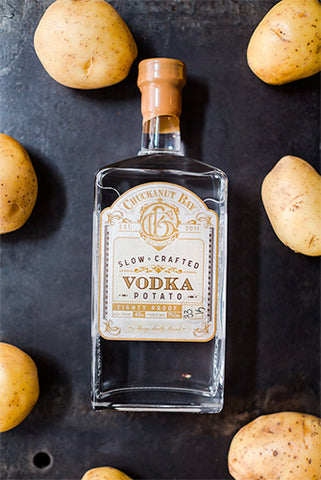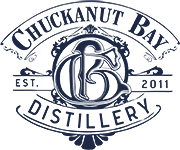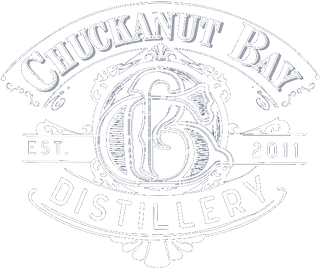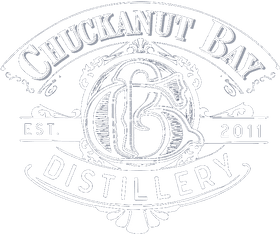
POTATO VODKA: THE DIRTY LOWDOWN
 Despite the persistent myth that vodka is usually made from potatoes, the fact is, potato vodkas are pretty hard to come by these days. Take a look at the big vodka brands that jump to mind - nearly all of them are made from grain. And there's a reason for that - making vodka from grain is considerably easier and more efficient. Potatoes? Not so much. But more on that later.
Despite the persistent myth that vodka is usually made from potatoes, the fact is, potato vodkas are pretty hard to come by these days. Take a look at the big vodka brands that jump to mind - nearly all of them are made from grain. And there's a reason for that - making vodka from grain is considerably easier and more efficient. Potatoes? Not so much. But more on that later.
Truth be told, you can make vodka from just about any agricultural substrate, as long as you can get it to ferment. In addition to grains like wheat, you'll find vodka made from corn, rice, fruit, and much more. To call it vodka, you just have to meet the following criteria (as spelled out by the Alcohol and Tobacco Tax and Trade Bureau):
Spirits distilled from any material at or above 95% alcohol by volume (190 proof), and if bottled, bottled at not less than 40% alcohol by volume (80 proof). Neutral spirits distilled or treated after distillation with charcoal or other materials so as to be without distinctive character, aroma, taste or color.
It's that last part that is particularly interesting: "...without distinctive character, aroma, taste or color." If that's the benchmark for quality vodka, how does one product achieve superiority over another? Should it strive to be even MORE without character? To have even LESS taste?
If that's the be-all, end-all goal for vodka, it has certainly been met many times over by countless (perfectly fine, mind you) products on the market. There's obviously a place for this type of spirit. When you're mixing a cocktail and want a versatile alcohol to provide punch without distracting from the flavor profile of the other ingredients - vodka!
 But as with most things in life, one size doesn't necessarily fit all. Sometimes, when you're sipping a vodka martini, for example, you'd rather conjure up images of lush, rolling fields in the old country than an austere hospital room scrubbed down in antiseptic. Needless to say, Chuckanut Bay Distillery Potato Vodka strives for the former.
But as with most things in life, one size doesn't necessarily fit all. Sometimes, when you're sipping a vodka martini, for example, you'd rather conjure up images of lush, rolling fields in the old country than an austere hospital room scrubbed down in antiseptic. Needless to say, Chuckanut Bay Distillery Potato Vodka strives for the former.
Making vodka from whole, fresh potatoes is no easy task. In fact, it’s almost comically inefficient. This is due in part to the biomass of a potato, which consists largely of water (about 80%). The other 20% is dry matter, and of that dry matter, only 60-80% of it is starch – the component that gets converted to sugar which is then fermented to create alcohol.
So it’s the starch of the potato that we’re after in this process, but potatoes don’t contain much starch relative to their total mass. An easier workaround for a less ambitious distiller would be to use dried potato flakes which contain far higher starch levels than whole potatoes on a per pound basis. And indeed, potato flakes serve as the substrate for several potato vodkas on the market.
Alas, that’s not how we roll here at Chuckanut Bay Distillery. Whenever possible, we strive to work with ingredients in their most natural, unprocessed form. That means procuring whole Yukon Gold potatoes harvested at the peak of growing season just a few miles south of us in the Skagit Valley, considered to be one of the finest potato-growing regions in the world.
It takes at least 50 pounds of Yukon Gold potatoes to make just one 750ml bottle of our vodka. Multiply that by 600 bottles, our batch yield, and you have 30,000 pounds of potatoes.
Why use Yukon Golds instead of cheaper and more readily available russet potatoes? Well, we tried that, actually. The result was less than impressive – an “oily” vodka that lacked the earthy old world charm we were striving to achieve in a potato vodka in the first place.
In contrast, our vodka made from Yukon Golds is simply exquisite. But don’t take our word for it; Chuckanut Bay Distillery Potato Vodka was one of only two vodkas in the world to win the New York International Spirit Competition’s Double Gold Medal in 2013.
We’ll leave you with the tasting notes from the prestigious Beverage Tasting Institute, where our potato vodka earned a gold medal and a score of 92 out of 100: “Clear color. Toasty aromas of nougat and raisin bread with a supple, crisp, dryish light-to-medium body and a tingling, interesting, long mocha cream, ground nuts, spiced fig, and minerals finish. A zesty fruit nuanced vodka that will mix brilliantly.”







